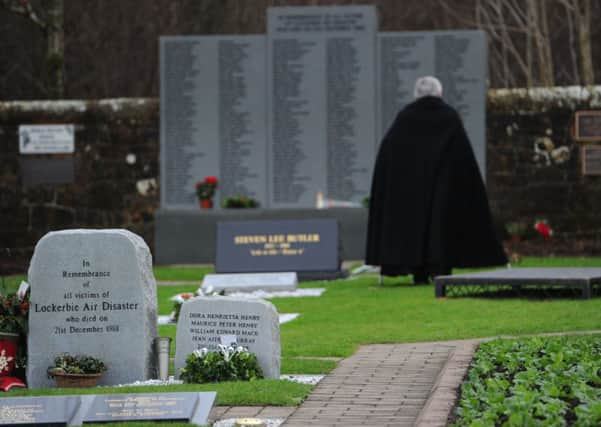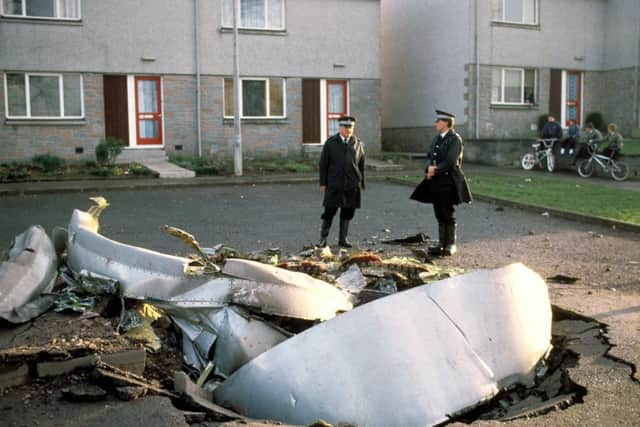Stephen McGinty: Sharing fellow man’s grief


LAST Thursday evening when I was travelling back from London, the train pulled in at a station. It was dark outside and only once our carriage passed into the station’s lights did we see the name on the signpost: Lockerbie. There are two towns in Scotland whose names conjure up unpleasant images and Lockerbie is the elder. It is 25 years ago tonight that its name was burned into the history books. Anyone Scottish who watches Homeland will recognise the strange frisson when the town is mentioned in the opening credits.
Small Borders towns should not be the scene of terrorist atrocities or be name-checked, a quarter of a century later, in American spy dramas.
Advertisement
Hide AdAdvertisement
Hide AdWhen I think of the Lockerbie bombing, it’s always the same images which come to mind, placed there six years ago when I wrote a series of articles on the atrocity. It is the image on the radar screen at the Scottish Area Control Centre in Prestwick as witnessed by Alan Topp, the duty officer. Pan Am flight 103: Clipper Maid of the Seas was represented on the screen by a small green square with a cross at the centre, beside which sat the transponder code “0357” and the flight level “310” (31,000ft, or just under six miles high.) Topp had just spoken to the captain who had said: “Good evening Scottish” and listened to the first officer request “oceanic clearance”. At 7:02pm he looked at the screen and saw that the small green square was missing. At first he thought the plane had entered a “zone of silence” an area where objects are invisible to radar, but a few seconds later he saw that the single green square had been replaced by four squares fanning out in different directions.


Among those falling pixels were a mother holding her baby, a passenger gripping a crucifix and two friends holding hands as they fell six miles. There was the Rattan family from New Delhi, who had been due to fly the previous day, but their young son got sick on the plane and the pilot returned to the gate to let them off.
There was also Frank Ciulla, an accountant from New Jersey, who was in the final months of a secondment to Britain. He had already flown home his family and was travelling to join them for Christmas.
In a new collection, Letters of Note, edited by Shaun Usher and published by Canongate, there is a beautiful letter written by the Connells, the owners of the small farm, eight miles from the crash site, where Mr Ciulla, who was 45 years old, came to land. It was written four years later, after Mr Ciulla’s family visited.
“When your dear one came to us from the night, it was so unbelievable, haunting and desperately sad. You said that your visit altered the picture for you in many ways; this is just how it was for us too. Frank was a young man with a name but connected to nobody. Now at last we can match him with a loving family.
“… It was just wonderful to meet you face-to-face. We needed to talk to you all too. As you said, we will get to know Frank through you. He was never just ‘another victim’ to us. For months we called him ‘Our Boy’. Then we found out his name. He was ‘Our Frank’.
“Please believe me we were deeply affected by his coming to us. We will never forget our feelings seeing him there, a whole-bodied handsome man, the life gone out of him in a twinkling. We were just past trying to grasp the whole thing. Then to have to leave him there, but he was visited throughout the night by police and a doctor and we went back again in the morning. He was a fellow man and he had come to us in the saddest way. So now through him we have you in our hearts, and please, we want you all to know that you are welcome here whenever you come.”
When I read this letter, tears prick at the corners of my eye for it is infused with that curious but precious by-product of disaster and tragedy – grace and love. Scotland’s largest case of mass murder should not go unmarked but I don’t believe today is the day to rehearse or re-argue the guilt – or otherwise – of the culprits, but to think about the 270 victims. When the anniversary of a terrible event such as this comes along, what should we, who have no ties of family or friendship to the victims, do? It seems insincere to imagine that if we have been untouched by violent tragedy we can have any idea of what the bereaved must feel even now after the passage of 24 Christmases with their unpurchased presents and empty place settings. We have no legitimate place in the pews of the remembrance services which will take place today in Lockerbie, London and America as we cannot really, honestly, remember people, individuals we did not know. And yet to allow today to pass un-noted, as simply the last Saturday before Christmas with all the mixture of jollity and stress this usually involves, does seem wrong.
Advertisement
Hide AdAdvertisement
Hide AdAnniversaries have a strange potency. The year aligns itself, like train carriages pulling up on parallel tracks, and allows us a clear view of what we were doing 12 months before but each year the gap between the carriages gets wider and it becomes harder to peer through the windows. Yet I have a clear memory of the night of the Lockerbie bombing. I was 16 years old and sitting alone in the front room of our house in Clydebank, watching It’s A Wonderful Life for the first time. I had a plate of chicken and mayonnaise sandwiches resting on a footstool and had made it clear I didn’t wish to be disturbed. I was a young cineaste then who believed a classic movie deserved one’s undivided attention right up until the last credit rolled. I had bought Frank Capra’s Christmas classic in the summer with the specific intention of watching it in the week before Christmas. I think I’d already teared up as the Young George Bailey takes a beating from Old Man Gower for failing to deliver the medicine the pharmacist had accidentally poisoned in his addled drunken grief over his dead son. I do remember my mum coming in to say that there had been a dreadful accident, a plane had crashed in the Borders, and while I was agreeing with her about how terrible it was, I was still anxious to get back to my movie and its lesson on how one life can touch so many. Looking back over those lines I’m prompted to press delete. Who genuinely cares where I was or what I was doing? And yet I’ve always been interested in what people were doing on those infamous dates like 11 September 2001; 22 November 1963; 7 July 2005; 13 March 1996 and 21 December 1988. Dates on which occurred events that punch with such force that the ripples touch everyone’s daily life. They touch us because we are human and naturally empathetic, but what good does that really do anyone and it still doesn’t really answer the question of what should the rest of us do on this day? I’m not posing this as a rhetorical question, as I’m genuinely unsure of what to do and what worth it would carry. Maybe it’s enough to think: ‘Wow, is it really 25 years ago? Time flies’ and shake our heads.
Or perhaps what we could do, certainly if I can remember, is to stop whatever we’re doing at two minutes past seven tonight and begin not a minute’s silence but a three-minute silence which is how long it took for Frank Ciulla, the crew and other passengers to fall from 31,000ft. Three minutes, 1/20th of one hour. It is not much. Can it do any tangible good? I doubt it but it can’t do any harm and just maybe the families of the victims can take a sliver of comfort that for a few specific minutes our thoughts are with them and their loved ones. Each one was, as the Connells’ eloquently put it our “fellow man”.